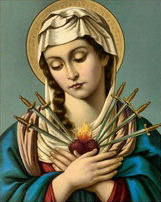September 2025 — Overview for the Month
September falls during the liturgical season known as Tempus per Annum or Ordinary Time (formerly Time After Pentecost), which is represented by the liturgical color green. Green is a symbol of hope, as it is the color of the sprouting seed and arouses in the faithful the hope of reaping the eternal harvest of heaven, especially the hope of a glorious resurrection. The liturgical color green is worn during prayer of Offices and Masses of Ordinary Time.
The Holy Father's Intentions for the Month of September 2025
For our relationship with all of creation.: Let us pray that, inspired by Saint Francis, we might experience our interdependence with all creatures who are loved by God and worthy of love and respect. (See also http://www.popesprayerusa.net/)
Feasts for September 2025
3. Gregory the Great, Memorial7. TWENTY-THIRD SUNDAY IN ORDINARY TIME, Sunday
8. Nativity of the Blessed Virgin Mary, Feast
9. Peter Claver (USA), Memorial
12. Most Holy Name of Mary, Opt. Mem.
13. John Chrysostom, Memorial
14. Exaltation of the Holy Cross, Feast
15. Our Lady of Sorrows, Memorial
16. Cornelius and Cyprian, Memorial
17. Robert Bellarmine, Hildegard of Bingen; Ember Wednesday, Opt. Mem.
19. Januarius; Ember Friday, Opt. Mem.
20. Andrew Kim Taegon, Paul Chong Hasang and Companions; Ember Saturday, Memorial
21. TWENTY-FIFTH SUNDAY IN ORDINARY TIME, Sunday
23. Pius of Pietrelcina, Memorial
26. Cosmas and Damian, Opt. Mem.
27. Vincent de Paul, Memorial
28. TWENTY-SIXTH SUNDAY IN ORDINARY TIME, Sunday
29. Michael, Gabriel & Raphael, Archangels, Feast
30. Jerome, Memorial
Focus of the Liturgy
The Gospels for the Sundays in September 2025 are from the Gospel of St. Luke from Cycle C, Weekdays following Year I.
September 7th | Luke 14:25-33: Anyone of you who does not renounce all possessions cannot be my disciple. | September 14th |
|
September 21st | Luke 16:1-13: You cannot serve both God and mammon. |
September 28th | Luke 16:19-31: You received what was good, Lazarus what was bad; now he is comforted, whereas you are tormented. |
Highlights of the Month
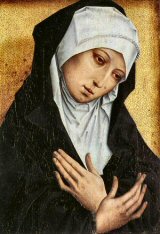 During September, as in all of Tempus per Annum, or Ordinary Time (formerly known as Time After Pentecost), the Liturgy does not focus on one particular mystery of Christ, but views the mystery of Christ in all its aspects. We follow the life of Christ through the Gospels, and focus on the teachings and parables of Jesus and what it means for us to be a follower of Christ. During Ordinary Time we can concentrate more on the saints and imitate their holiness as Christ's followers.
During September, as in all of Tempus per Annum, or Ordinary Time (formerly known as Time After Pentecost), the Liturgy does not focus on one particular mystery of Christ, but views the mystery of Christ in all its aspects. We follow the life of Christ through the Gospels, and focus on the teachings and parables of Jesus and what it means for us to be a follower of Christ. During Ordinary Time we can concentrate more on the saints and imitate their holiness as Christ's followers.
This month the main liturgical feasts are:
St. Gregory the Great (September 3)
Nativity of Mary (September 8),
St. Peter Claver (September 9),
Holy Name of Mary (September 12),
St. John Chrysostom (September 13),
Exaltation of the Holy Cross (September 14),
Our Lady of Sorrows (September 15),
Sts. Cornelius and Cyprian (September 16),
St. Robert Bellarmine and Hildegard of Bingen (September 17)
St. Januarius (September 19),
St. Andrew Kim and Companions (September 20),
St. Pio (September 23),
Sts. Cosmas and Damian (September 26),
St. Vincent de Paul (September 27),
Sts. Michael, Gabriel and Raphael (September 29) and
St. Jerome (September 30).
The commemorations of St. Matthew (September 21) and Sts. Wenceslaus and Lawrence Ruiz and Companions (September 28) fall on a Sunday and are superseded by the Sunday Liturgy.
Month of the Harvest
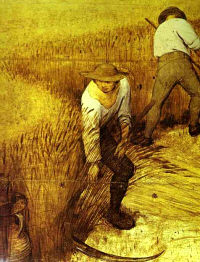 Since man is both a spiritual and physical being, the Church provides for the needs of man in his everyday life. The Church's liturgy and feasts in many areas reflect the four seasons of the year (spring, summer, fall and winter). The months of August, September, October and November are part of the harvest season, and as Christians we recall God's constant protection over his people and give thanksgiving for the year's harvest.
Since man is both a spiritual and physical being, the Church provides for the needs of man in his everyday life. The Church's liturgy and feasts in many areas reflect the four seasons of the year (spring, summer, fall and winter). The months of August, September, October and November are part of the harvest season, and as Christians we recall God's constant protection over his people and give thanksgiving for the year's harvest.
The September Ember Days were particularly focused on the end of the harvest season and thanksgiving to God for the season. Ember Days were three days (Wednesday, Friday and Saturday) set aside by the Church for prayer, fasting and almsgiving at the beginning of each of the four seasons of the year. The ember days fell after December 13, the feast of St. Lucy (winter), after the First Sunday of Lent (spring), after Pentecost Sunday (summer), and after September 14, the feast of the Exaltation of the Holy Cross, after the Third Sunday of September (autumn). These weeks were known as the quattor tempora, the "four seasons."
Since the late 5th century, the Ember Days were also the preferred dates for ordination of priests. So during these times the Church had a threefold focus: (1) sanctifying each new season by turning to God through prayer, fasting and almsgiving; (2) giving thanks to God for the various harvests of each season; and (3) praying for the newly ordained and for future vocations to the priesthood and religious life.
Since the reorganization of the Roman calendar in 1969 after the Second Vatican Council, Ember Days are still retained in principle, but how and when they are to be observed is at the discretion of each country's Episcopal Conference. There is no longer set Mass readings for the Ember Days in the current Roman Missal.
Another harvest feast is September 29, the Feast of the Archangels Michael, Gabriel and Raphael. Before the revision of the calendar, this used to be only the feast of St. Michael. In many countries this day was referred to as "Michaelmas" and celebrated with traditional foods and customs.
By Jennifer Gregory Miller
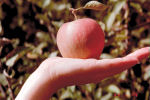
Explanation of Ember Days—Three days set apart for fasting, abstinence, and prayer during each of the four seasons of the year. They were the Wednesday, Friday and Saturday after St. Lucy (or Lucia, d. 304) (December 13), the First Sunday of Lent, Pentecost, and the feast of the Holy Cross (September 14). Since the revision of the Roman calendar in 1969, Ember Days are to be observed at the discretion of the National Conference of Bishops. Moreover, their observance may be extended beyond three days and even repeated during the year. Possibly occasioned by the agricultural feasts of ancient Rome, they came to be observed by Christians for the sanctification of the different seasons of the year, and for obtaining God's blessing on the clergy to be ordained during the Embertides. (Etym. Anglo-Saxon oemerge, ashes.)
—Modern Catholic Dictionary by John A. Hardon, SJ, Doubleday, 1980.
This item 12519 digitally provided courtesy of CatholicCulture.org


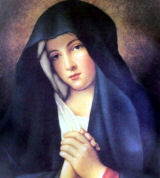


 The Monogram of the Blessed Virgin. The letters of the name "Maria" are evident in this ancient symbol. A crown was sometimes placed over the monogram by medieval artists.
The Monogram of the Blessed Virgin. The letters of the name "Maria" are evident in this ancient symbol. A crown was sometimes placed over the monogram by medieval artists.  The moneybags refer to the occupation of St. Matthew before he was called to follow Christ. He was a tax gatherer known as Levi.
The moneybags refer to the occupation of St. Matthew before he was called to follow Christ. He was a tax gatherer known as Levi. The great work of the Archbishop of Constantinople to overcome crime, heresy, and corruption was interrupted by avaricious enemies who effected his exile, which lasted four years, and ended with his death.
The great work of the Archbishop of Constantinople to overcome crime, heresy, and corruption was interrupted by avaricious enemies who effected his exile, which lasted four years, and ended with his death. One of the Four Western Fathers, along with Sts. Augustine of Hippo, Ambrose of Milan and Gregory the Great. He contributed courage and wisdom in his defense of the truth. His translation of the Bible into Latin, known as the Vulgate, is in general, the version authorized in the Roman Catholic Church.
One of the Four Western Fathers, along with Sts. Augustine of Hippo, Ambrose of Milan and Gregory the Great. He contributed courage and wisdom in his defense of the truth. His translation of the Bible into Latin, known as the Vulgate, is in general, the version authorized in the Roman Catholic Church.